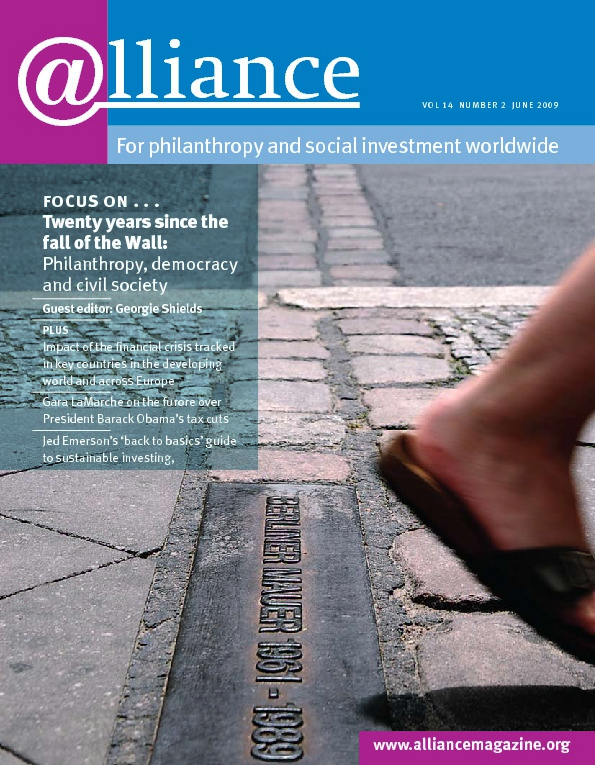Mike Edwards, former director of the Ford Foundation’s Governance and Civil Society unit, reminded an audience of charitable trusts and foundations in London last year that ‘democracy is a journey, not a destination: a process of contestation that unfolds over time and is rarely if ever completed’. This is as true in the ‘more mature’ democracies as it is in those ‘emerging’.
 The societies of Europe and North America continue to exclude and marginalize certain social and economic groups. Low voter turnout and historically declining civic engagement in the US (at least pre-Obama) and the UK have raised concerns about the ‘diminishing’ nature of these centuries-old democracies, now afflicted by a growing sense among citizens of alienation from the political process.
The societies of Europe and North America continue to exclude and marginalize certain social and economic groups. Low voter turnout and historically declining civic engagement in the US (at least pre-Obama) and the UK have raised concerns about the ‘diminishing’ nature of these centuries-old democracies, now afflicted by a growing sense among citizens of alienation from the political process.
For all societies that value people’s participation in local and national affairs, a willingness to recognize failures and an openness to learn and to change are essential.
No appetite for exports
Yet for decades the field of democracy promotion has been dominated by an approach that is contrary to this spirit, one of telling rather than listening. Led by bilateral and multilateral aid and foreign assistance programmes, as well as private foundations, democracy promotion has been understood as the process of ‘exporting’ democracy from those who were considered to have it – largely the older and so-called ‘mature’ democracies of the global North – to those who needed it, such as the younger democracies in the global South, or the post-socialist states of Eastern Europe and southern Asia, with little attention to what could be learned from elsewhere to solve democratic deficits at home.
To a degree, this was a holdover from previous eras, when democracy assistance was partly shaped by the Cold War. It was also partly inspired by a desire to promote the wave of democratic decentralization that swept Latin America and Africa, especially during the 1990s as authoritarian regimes receded. Similar motifs continue now; for some, democracy promotion is about countering the ‘war on terror’, or the need to overcome the fragility of states.
Those on the receiving end are growing increasingly cynical of these agendas.
A different approach to promoting democracy is, however, possible: one that values the innovations in participatory and deliberative practices that have occurred across the globe in the last 15 years and recognizes all democracies as equal companions on the journey. These innovations already have a momentum of their own, and recent political changes in the US may provide the opportunity to change our understanding of what democracy promotion is all about.
Democratizing the democracy debate
US President Barack Obama was a community organizer in Chicago, where he saw the challenges of democracy from below; his grasp of the power of community organizing was made clear in the grassroots techniques he employed in his campaign. Furthermore, his own family heritage and childhood years in other nations have made him – by his own account – willing to listen to different perspectives from across the globe.
At this historical juncture, with so much will to change, foundations can have a tremendous impact by democratizing the democracy debate, reversing the flow so that democracy promotion is about learning rather than preaching. In this context, democracy promotion takes on a new meaning as a more democratic conversation, with listening and learning from South to North as well as the other way around.
Taking participatory budgeting to London
Where such a reversal has occurred, the results are already apparent. In Tower Hamlets, London, Shazia Hussain’s job is to manage the Local Strategic Partnership and facilitate public involvement in what is a deprived London borough. She first heard of participatory budgeting when she attended the 2007 Champions of Participation workshop hosted by the Citizenship DRC, LogoLink and other UK partners, which brought together 44 local government and civil society leaders from 15 countries. Listening to a presentation by Olivio Dutra, the former mayor of Porto Alegre, Brazil, Hussain says something clicked. ‘It took the whole discussion to a higher level,’ she said. ‘It just wasn’t about engagement; it was about active participation in decision-making.’
Porto Alegre has become famous for letting citizens decide how to spend portions of its budget. In a first stage, citizens are invited to attend local meetings to deliberate on spending priorities. Then they choose a representative to transmit their opinion at subsequent meetings. The process culminates more than a year later in a spending plan. Inspired by the example, Hussain returned to London to advocate for participatory budgeting in her own borough. Owing to her efforts, her local council has agreed to set aside £2.4 million to be allocated using some of the same methods as used in Brazil.
Forms of participatory budgeting have spread throughout the world, and vibrant citizen and local government networks are documenting and sharing their work in the field. But there are other examples of democratic innovations in the South that are being taken on board elsewhere. Participatory methods of assessment and planning, many of which emerged from the development field, have been adapted by local governments; participatory forms of building accountability, such as citizen watchdog committees, social audits and report cards, are also gaining credence.
India, the world’s largest democracy, is one example of how such reforms are coming together to produce demands for a more inclusive and participatory democracy. There, a highly successful popular movement has led to one of the strongest right to information laws in the world, which is being used by citizens to hold local governments to account. Constitutional reform in the mid-1990s created new forms of local governance, which also mandated that one-third of elected officials be women and one-third from the lower castes. Now, India boasts more women’s elected representatives than all of the Western democracies put together, many of whom, while holding office for the first time, are also forming their own associations, and demanding that women’s issues be elevated on the public agenda.
Some fundamental lessons
While there is much to be learned in older, ‘diminishing’ democracies from the gains of democracy in places like India and Brazil, ‘reversing the flow’ should not repeat the mistakes of past democracy promotion programmes that assumed what worked in one place would also work in another. Rather, our research and that of our partners at the Institute of Development Studies points to several more fundamental lessons about the strengthening and expansion of democracy.
First, democracy is not a set recipe that can be promoted elsewhere. It is not about transferring one set of mechanisms or practices in one context to another, nor about following a straight linear path of ‘democratization’. Rather, it is a historical process through which citizens in different contexts exercise voice, gain rights and deepen their participation in public matters, with lots of ebbs and flows in along the way. How this happens, and in what sequence, will vary from one context to another.
Second, while democratic institutions are critical, they are often created from below as well as from above. Much traditional democracy promotion funding focuses on creating a set of institutions – fair elections, parliaments, rules of law, media – on the assumption that active citizenship and democratic participation will follow. But citizens also help create and strengthen institutions, through their struggles for new rights, their demands for accountability, and their advocacy for government reforms.
In fact, when so-called democratic institutions are seen from a citizens’ perspective, our research suggests that they may appear not so democratic after all. A good example was found in the 2007 elections in Nigeria, Africa’s largest democracy. Huge amounts of funding went to the government-appointed commissions to oversee ‘fair’ elections, which, in the context of the history of corruption in the country, was seen by some as ‘paying the fox to guard the chicken coop’. Little external money went to support civil society organizations, which mobilized members across the country to monitor the election process themselves, with many risking their lives to do so.
Third, given that democracy is neither a set recipe nor a well-mapped journey, there is a need to widen the conversation on what democracy is about, recognizing that in different contexts it will take different paths and forms. The language of democracy is now widely used by a range of different actors, from large multilateral institutions and powerful foreign aid programmes to grassroots activists and social movements. Yet the word has radically different meanings, with different consequences for practice. At the same time, certain models of democracy – usually those based on neoliberal or liberal representative understandings – often dominate the conversation. For this reason, it is important to democratize the debate itself, to move beyond one-size-fits-all approaches. Learning across contexts can help us do so.
What should philanthropy do?
What then does this mean for philanthropy seeking to engage in democratic promotion? It means going beyond the divisions that often occur between those who work in the North and those who support democracy abroad, to look for points of interchange. It also means crossing the divide that occurs within donor institutions between projects that work with government and those that work with civil society, to focus on both sides of the equation.
It also means staying involved for the long haul. Too often, funds for democracy work flow largely at the time of transition from authoritarian to democratic regimes. Once the trappings of democracy are in place, funders move on. But the experiences of northern countries, as well as emerging democracies, show that building democracy is a long-term process. After all, it took the US over 150 years from its democratic independence to allow women the right to vote, and then only after decades of citizen mobilization.
There are good examples of new approaches to democratic conversation happening – too many to list here – but much is still to be done, and now is the moment. At a time of crisis, in both North and South, and with a president in the US who has both international experience and a commitment to democratic revitalization, now is the time to start a new kind of democratic conversation, which learns from other nations about their democratic innovations and, in so doing, strengthens democratic practice at home. It is no longer the time for the US or Europe to pretend to be the guardians or promoters of democracy for other nations. They need to start by taking more care of their own.
John Gaventa (left) and Nick Benequista are based at the Development Research Centre on Citizenship, Participation and Accountability at the Institute of Development Studies. Emails J.Gaventa@ids.ac.uk and N.Benequista@ids.ac.uk
 Leila Murcasel – What democracy means to me
Leila Murcasel – What democracy means to me
Democracy must include and ensure the right to free expression and association as well as the right to vote in free and fair elections and all civil and human rights. But we must go beyond that basic conception of democracy to more direct and active citizen participation – referendums, popular consultations on key topics, participatory budgets, among them. I see new expressions of democracy like this emerging all the time in many Latin American countries including Ecuador, Bolivia, Brazil, Venezuela and Argentina. This is excellent news in a world in crisis ruled by leaders who mostly lack legitimacy.
How important are civil society organizations?
In Argentina, civil society organizations have played an important role in achieving democracy since the restoration of democratic government in 1983, and previous to that they were vital in helping secure it. Not only do they provide new and renewed avenues for participation, but they also contribute to our society’s welfare and sustainability. I mention this because what the liberal concept of democracy often overlooks is that a basic level of quality of life is a prerequisite for a democratic society. Our experience shows there is no possible democracy with unjust and unequal societies. CSOs and social movements in general have played a key role in making this visible and challenging traditional conceptions of society and democracy.
What opportunities do you have to participate in your community and your country?
As an individual citizen, I feel I have many such opportunities. I can vote freely, I can express my ideas, I can demand information from my representatives, etc. But I believe that I can assert my rights as a citizen more effectively as part of a social group than as an individual. That is why we need to strengthen our social networks and public spaces at all levels: it is through acting collectively that we can have a real impact on powerful institutions.
Moreover, though I’m aware of my rights and duties as a citizen, not everyone is. Both governments and civil society must act to make sure they become so. I participate in a CSO that promotes youth citizenship and participation in Argentina (Argentinean Youth Organization for the United Nations – http://www.oajnu.org).
In addition, there are stakeholders whom no one votes for but who nevertheless have a powerful impact in our societies: the mass media and corporations. The only way of reducing their negative impact on our democratic institutions is to institute checks that prevent them overusing their influence.
Leila Murcasel is active in the Argentine youth and student movement
For more information
- Champions of Participation: Engaging citizens in local government
- Democratising Engagement: What the UK can learn from international experience by Andrea Cornwall
- Triumph, deficit or contestation? Deepening the ‘deepening democracy’ debate by John Gaventa
All available from http://www.drc-citizenship.org
Also of interest
Matt Leighninger (April 2009) Funding and Fostering Local Democracy: What philanthropy should know about the emerging field of deliberation and democratic governance. PACE (Philanthropy for Active Civic Engagement).


Comments (0)